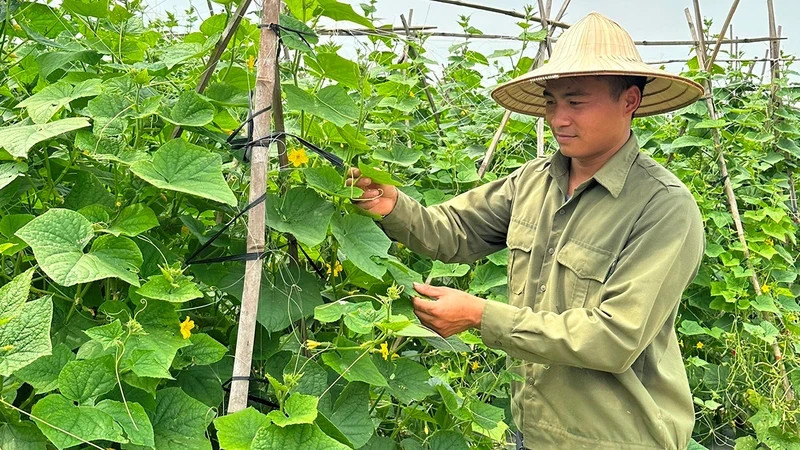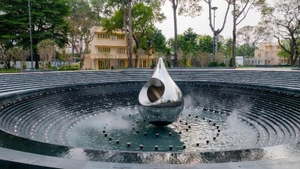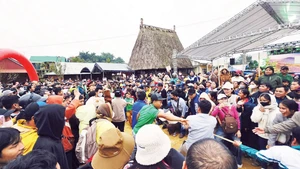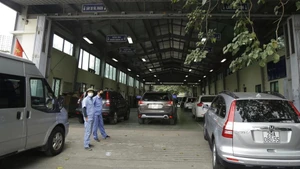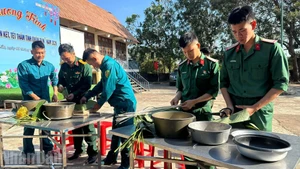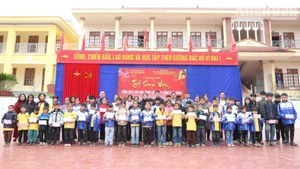The Plant Protection Department said that Vietnam has many advantages in terms of raw materials for the production of organic fertilisers, especially with about 156 million tonnes of by-products in the cultivation, breeding and processing of agricultural products, animals, plants and aquatic products. Therefore, taking advantage of this by-product source brings many benefits to the agricultural sector.
Small scale, big benefits
Thanh Xuan Organic Clean Agriculture Service Cooperative, Thanh Xuan Commune, Soc Son District, Hanoi, has about 30 hectares of land, with about 30 vegetable production groups. On average, the cooperative supplies the market with more than 300 tonnes of vegetables, tubers, and fruits of all kinds each year.
Do Thi Thanh, manager of the Bai Thuong vegetable production group of Thanh Xuan Organic Vegetable Cooperative, said that Bai Thuong's vegetable products are certified organic according to Vietnamese standards. Every day, the cooperative supplies the market with 100-150kg of various vegetables.
To produce clean vegetables, the cooperative uses completely organic fertilisers during the cultivation process, mostly from its own composting. After harvesting, the cooperative uses the old vegetable stems and leaves, straw, and manure to produce compost. The method is very simple, just boil brown sugar and cold rice to make a preparation, then spread it evenly on the compost pile. After about three months, these by-products will decompose completely and can be used as fertiliser for plants.
Making your own compost helps save a lot of costs as well as eliminating the need to transport by-products for disposal, saving money on buying fertiliser, and at the same time, helping to increase productivity, quality and value for Bai Thuong's vegetable products. As a result, the income of farmers is stable, ranging from 8-10 million VND per month.
Chairman of the Vietnam Fertiliser Association Phung Ha said that the use of organic fertilisers brings many benefits. In addition to providing stable nutrients for crops, organic fertilisers have the effect of improving the physical, chemical and biological properties of the soil, limiting leaching, increasing the permeability and water retention capacity of the soil, increasing the drought resistance of crops, and reducing a lot of the input costs for farmers.
The method of producing and using organic fertilisers is increasing rapidly in localities with movements to develop organic agriculture and clean agriculture. Especially in localities with synchronous coordination from local authorities, specialised agencies, fertiliser production enterprises, and agricultural product purchasing enterprises in transferring production processes and supplying microbial products to farmers for on-site production.
The method of producing and using organic fertilisers is increasing rapidly in localities with movements to develop organic agriculture and clean agriculture.
Currently, many localities have done a good job of guiding farmers in producing organic fertilisers for themselves.
To reduce environmental pollution in livestock farming and have a source of organic fertilisers for production, the functional sector of Mo Cay Nam District has organised and implemented many models to support people in composting organic microbial fertilisers.
Furthermore, to motivate people, the locality also consults and implements many organic composting points as well as supports farmers with microorganisms for composting. As a result, many households have successfully produced organic fertilisers themselves.
Guidance and methodical support needed
Organic fertiliser production by traditional methods carried out at households is mainly based on raw materials such as waste or by-products collected from livestock and crops.
There are currently many different composting methods such as hot composting, cold composting, hot-first-cool composting, or advanced composting methods using microbial products, adding earthworms.
It can be seen that the source of raw materials for organic fertiliser production in the country is very rich and available locally. The methods and technologies for producing organic fertilisers are easy for most farmers.
However, in many places, farmers are still hesitant to use organic fertilisers to fertilise crops. The main reason is the pressure to increase productivity and the convenience of inorganic fertilisers such as being compact and quickly affecting plant growth, so people mainly use inorganic fertilisers.
Faced with this situation, the relevant authorities need to propagate so that farmers clearly understand the dangers of overusing chemical fertilisers, thereby gradually changing farming habits, harmoniously using inorganic and organic fertilisers. Encourage farmers to take advantage of agricultural waste to produce organic fertilisers themselves.
The production of organic fertilisers in households is currently spontaneous, so it is necessary to develop a set of technical guidelines on collecting and utilising agricultural by-products to make traditional organic fertilisers on a household scale in a systematic manner.
It is necessary to research, apply and transfer technology to produce organic fertilisers for households at low cost, with high organic content, to reduce greenhouse gas emissions for agriculture.
At the same time, it is necessary to urgently develop and deploy a long-term propaganda and training campaign for farmers on the use of agricultural waste and by-products to produce traditional organic fertilisers with visual, vivid, and easy-to-understand-and-implement models. From there, it is necessary to change people's customs and habits and gradually build a movement to produce organic fertilisers nationwide.
